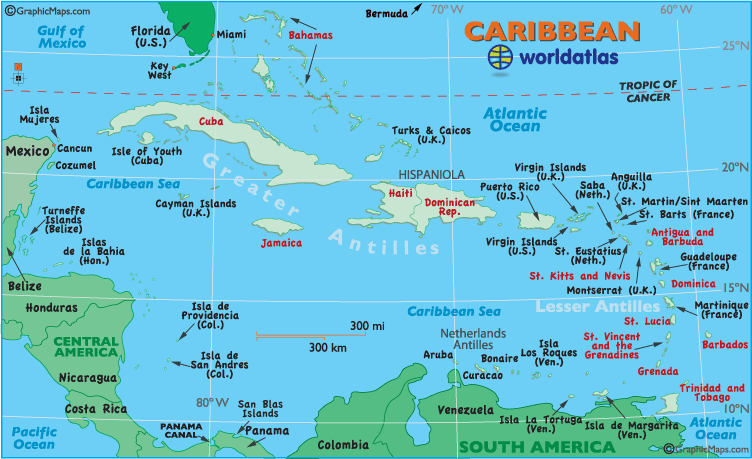
Rum and a WTO dispute? This looks plausible with the Caribbean countries raising the issue of "subsidization" of the rum industry in the U.S. The issue was widely reported here, here and here. The Caribbean countries are the 13 island countries in the Caribbean sea which includes Antigua, Dominican Republic and Haiti.

The Caribbean countries produce and export rum in large quantities to the U.S. and EU. The issue essentially pertains to the "cover-over" program wherein the U.S. provides refunds of excise tax collected on rum to the U.S. States producing it. A brief history of the cover-over program is provided by this Congress Research Service Report.
Apart from the Caribbean countries, Puerto Rico (PR) and U.S. Virgin Islands (USVI) also produce rum which serves as competition to the rum produced in the Caribbean countries. The funds received by PR and USVI in turn is being allegedly used to develop the rum industry and infrastructure in these U.S. States that adversely impacts rum producers in the non-US Caribbean countries. The U.S. transfers 98%
of the revenues collected on excise taxes imposed on rum sold in the US market to the
Governments of Puerto Rico and the USVI. The programme does not provide any limitation as to how these two territories are to spend the
transferred revenues. Until 2008, these funds were used for infrastructural development and
welfare programmes by the Governments of the two territories. However, both territories are
now said to be using some of these funds to finance activities aimed at the promotion and
assistance of the local rum industry, to the detriment of rum producers established in
these countries.
The issue of the use of the funds for assisting the local rum industry has to be critically analyzed in the context of U.S. obligations under the ASCM Agreement. While use of the funds for general infrastructural development may be out of the purview of a WTO law inconsistency, specific programs to promote and develop the rum industry may be suspect. Would it amount to a prohibited or actionable subsidy under ASCM? Would it violate the NT and MFN principles under GATT?
The issue of the use of the funds for assisting the local rum industry has to be critically analyzed in the context of U.S. obligations under the ASCM Agreement. While use of the funds for general infrastructural development may be out of the purview of a WTO law inconsistency, specific programs to promote and develop the rum industry may be suspect. Would it amount to a prohibited or actionable subsidy under ASCM? Would it violate the NT and MFN principles under GATT?
Cato explains the dispute lucidly here:
"The antagonist in this saga is something known as the “rum cover-over” program. As it does with all distilled spirits, the federal government charges an excise tax of $13.50 per proof gallon of rum sold in the United States. This equates to roughly $2 per bottle. Under the cover-over program, almost all of that money is directly granted to the U.S. Virgin Islands and the Commonwealth of Puerto Rico using a complex formula so that each receives a share of the money based on how much rum it produces relative to the other. The tax is collected from sales of all rum imported to the mainland, even from other countries, and in 2010 the cover-over amounted to approximately $450 million—$100 million to the Virgin Islands and $350 million to Puerto Rico.
The industrial death spiral began when the government of the U.S. Virgin Islands cleverly discovered that, instead of using the money for infrastructure and welfare programs, it could use the bulk of the money to entice Captain Morgan producer Diageo to relocate there from Puerto Rico. Because the move will increase rum production in the U.S. Virgin Islands relative to Puerto Rico, the subsidy more than pays for itself by it helping the territory capture a larger share of cover-over funds."
Is the refund of excise taxes by the U.S. to PR and USVI and their subsequent use to promote the local rum industry in violation of U.S. obligations under the ASCM and GATT? The measures seem to have an adverse impact on the rum producers of other Caribbean countries and thus, as observers believe, amount to an actionable subsidy under WTO law. Will the Caribbean rum producing countries initiate a WTO dispute against the U.S.? Dominican republic, which has joined the Tobacco Plain Packaging dispute against Australia is likely to initiate this dispute against the U.S.

(Local Caribbean sugarcane growers)
The impact the U.S. measure has on local, small time producers of rum in the Caribbean countries is brought out by this commentary:
"While there is understanding of the economic problems facing the USVI, the reality is that the US Congress has allowed its USVI development program to divert hundreds of millions to primarily provide a development program for the largest distilled spirits companies in the world. In this way the US is damaging one of the few competitive industries that Cariforum nations have and which helps underpin the economic viability of small and sometimes vulnerable Caribbean states....
Rum has a special place in the hearts and minds of Caribbean people. It is a product that brings identity through small producers to the islands and countries of Cariforum from which it comes. Unlike the product of large multinational distilling groups the success of Cariforum producers does not result from artificial tax breaks, transfer pricing or subsidy. Instead it is an industry dominated by small local distillers whose product is export oriented, brings much needed foreign exchange, adds value to primary agriculture and provides significant levels of tax and revenue to Governments struggling to deliver social programmes.
Will the Rum dispute go all the way to the WTO?That is why rum has always been a product worth fighting for, as Europe knows to its cost and the US is about to discover."
No comments:
Post a Comment